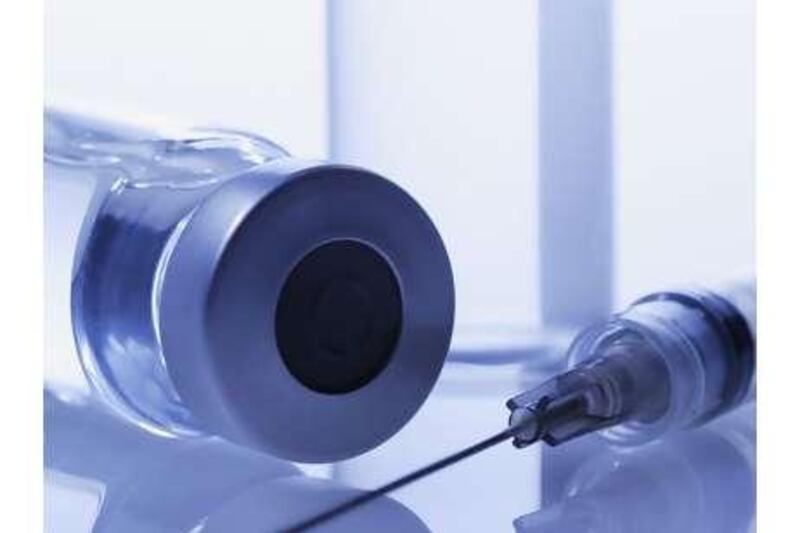RAS AL KHAIMAH // Gulf Pharmaceutical Industries (Julphar), the country's oldest drugs manufacturer, will open a plant to produce insulin from scratch in less than two years. The company, which is based in Ras al Khaimah and was founded in 1984, will spend Dh500 million (US$136.1m) on an expansion designed to produce drugs to combat the so-called lifestyle diseases common in the region, most notably, diabetes.
The new facility will produce more than 50 million vials of insulin, which will be sold throughout the MENA region, said Dr Ayman al Sahli, Julphar's general manager. "This will be a true Emirati product." The company now imports the raw materials for insulin from Europe. Being able to produce the drug from scratch will allow Julphar to better control costs, Dr al Sahli said. It makes sense to manufacture insulin locally, said Pascal Baz, a pharmaceuticals consultant with Stanton Chase in Dubai. "The UAE is the centre of the Gulf," she said. "They can better address demand locally and not having to ship from Europe or the Levant will lower costs. Also, it makes it easy to export to the Gulf region."
About 90 per cent of the pharmaceuticals in the UAE are imported, which can lead to high prices and critical shortages. It also means very little of the money spent on medicine is reinvested in the local economy. About Dh1.4bn was spent on pharmaceuticals last year in the Emirates. Demand for insulin in the UAE will only grow. One in four nationals shows evidence of having diabetes, according to Government health statistics. About 25 per cent of Emirati men and almost 40 per cent of women in the country are classified as obese and are at higher risk of developing the disease.
The healthcare sector is booming in the Gulf overall and valued at between $15bn and $18bn last year. It is expected to grow five-fold by 2025 and companies are scrambling for a piece of the action. "The regional market had been ignored for so long," Dr al Sahli said. In addition to Julphar, there are three other pharmaceuticals manufacturers in the Emirates: Neopharma, Globalpharma and Medpharma.
The Julphar campus, with the main administrative building and nine plants that manufacture 186 products that can create 800 medicinal formulations, sits in a quiet corner of this northern emirate. Julphar was established under the patronage of Sheikh Saqr bin Mohammed, Ruler of Ras al Khaimah, and produced generic pain killers and cough suppressants. The company has grown into a global exporter to 40 markets worldwide with sales of Dh762m last year, an increase of 22 per cent compared to 2008.
Dr al Sahli said about 90 per cent of its profits come from overseas sales. "We are from Ecuador to Thailand," he said. Two plants, the one to produce insulin and another to manufacture products such as ointments and creams, are under construction. Last year Julphar opened a facility that cost Dh100m to produce antibiotics. In many ways, Julphar illustrates the findings of a recent survey by HSBC that UAE companies were the most internationally focused of those in any of the countries where the bank operates. It said 91 per cent of the survey's respondents from the Emirates said they had operations abroad, topping the bank's global average of 76 per cent.
Unlike those UAE companies, however, Julphar is not looking to India for its next expansion. "It's a huge market ? but difficult for Julphar to penetrate," Dr al Sahli said. "With the low prices, it is difficult to manufacture here and ship there." Last year, the company struck a deal to be the only UAE company to provide MENA with a swine flu vaccine. Julphar partnered with Hualan Biological Bacterin of Beijing, which was the first in the world to enter clinical trials for the Pandemic H1N1 Influenza single-shot vaccine.
The UAE company employs about 1,500 workers of 20 nationalities. Dr al Sahli said he believes that diversity is an asset when recruiting staff, giving them an edge in the stiff competition for medical workers. It operates a training centre onsite and sponsors a variety of programmes to encourage Emiratis to become the pharmacists, technicians and doctors who could work for Julphar. It also has scholarship programmes with local universities to encourage students to study subjects related to the pharmaceutical industry.
ashah@thenational.ae






